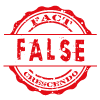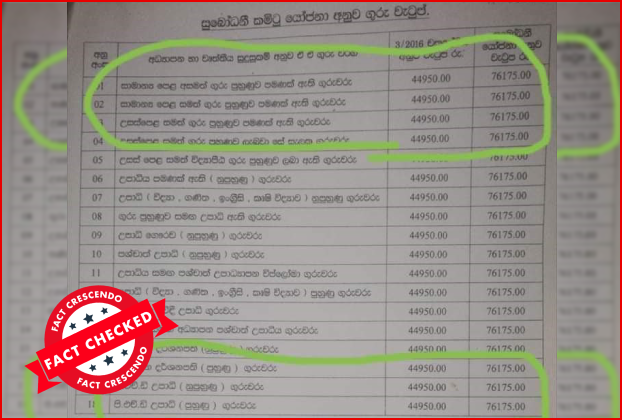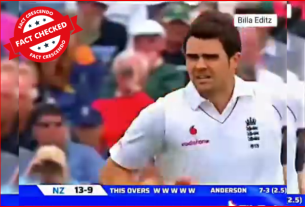Subscribe to our WhatsApp Channel
In Sri Lanka, the salaries of educational professionals, including teachers and principals, have become a highly discussed topic, especially in light of teachers’ trade unions demanding the full implementation of the recommendations made by the Subodhini Committee. Amidst this backdrop, there is a significant amount of misleading information circulating on social media about the Subodhini Committee and its recommendations, adding to the confusion and tension surrounding this issue.
Social Media Posts
Social media posts state that the salary increment suggested by the Subodhini Committee in 2020 results in teachers with graduate, postgraduate, and just A/L qualifications receiving the same starting salary.
We decided to search on this.
Background:
The salary anomaly issue for teachers, teacher advisors, and the principal service in Sri Lanka has been a long-standing problem. Numerous trade union actions have taken place to address this issue. In response, the Subodhini Committee was appointed by then Education Minister Dullas Alahapperuma to solve the salary anomalies in the education sector. The committee proposed salary increments and other recommendations for the state school education sector. However, the government did not implement these recommendations, citing financial constraints exacerbated by the COVID-19 pandemic.
During the pandemic, teachers’ trade unions initiated a prolonged strike, leading the government to appoint a cabinet committee to review the Subodhini Committee’s recommendations along with those from previous related committees. Based on this review, the government released a circular increasing the salaries of teachers, principals, and teacher advisors, although this increment was not as high as the Subodhini Committee’s original recommendations. The circular released in 2022 January can be read here . It represented only a portion of the proposed salary adjustments. This partial implementation has led education unions to renew their calls for the full implementation of the Subodhini Committee report.
Analysis:
Subodhini Committee Recommendations:
The Subodhini Committee’s report provides a detailed structure for salary increments, which vary by grade and qualification level.
The recommendations clearly outline different starting salaries for teachers based on their qualifications and grade levels.
Graphic Credit: Daily Mirror
You can also read the Subodhini Committee report from here
In Sri Lanka, the highest level of teachers’ services is categorized under Grade 1, which stands out as a distinct category. Teachers in this grade receive higher salaries compared to others. The grades and promotions within the teaching profession are determined based on qualifications, with various salary levels corresponding to different qualification levels and years of experience. This structured system ensures that teachers’ compensation is aligned with their educational background and professional tenure.
Viral Social Media Posts are misleading:
The claim that teachers with varying qualifications (graduates, postgraduates, and those with just A/L qualifications) receive the same starting salary under the Subodhini Committee’s recommendations is misleading.
The committee’s report specifies differentiated salary scales, ensuring that higher qualifications correspond to higher starting salaries.
Statement from Mahinda Jayasinghe, CTSU:
Mahinda Jayasinghe of the Ceylon Teacher Services Union (CTSU) has stated that the viral social media posts are misleading.
He reaffirms that the salary increments recommended by the Subodhini Committee are not uniform across different qualification levels.
Follow us and stay up to date with our latest fact checks.
Facebook | Twitter | Instagram | Google News | TikTok
Conclusion:
The social media posts claiming that the Subodhini Committee’s salary increment recommendations result in teachers with different qualifications receiving the same starting salary are misleading. The committee’s report specifies distinct starting salaries based on qualifications and grade levels. The partial implementation of these recommendations has led to continued trade union actions, with unions demanding the full execution of the proposed salary adjustments.
This fact check confirms that the viral claims are inaccurate and do not reflect the actual recommendations of the Subodhini Committee.

Title:Misleading Claims About Subodhini Committee Recommendations
Fact Check By: Fact Crescendo TeamResult: False






